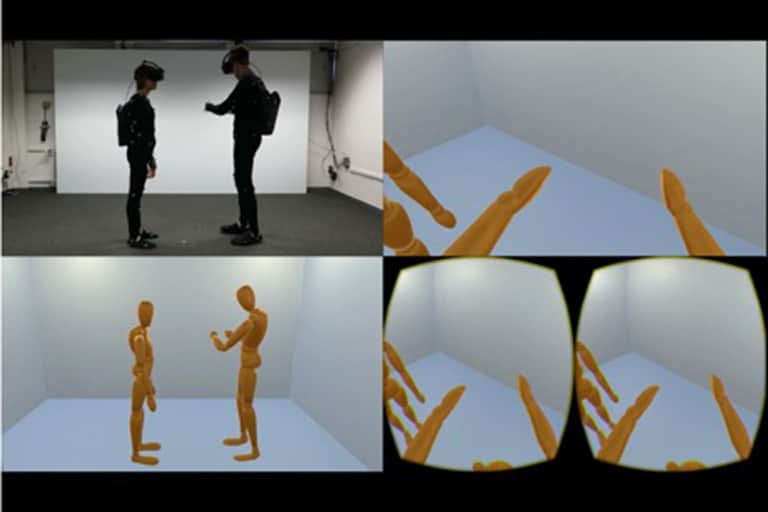A new lab focused on the interdisciplinary study of the effect of virtual reality experiences on human interaction has found a brick-and-mortar home within the Michigan State University College of Communication Arts and Sciences.
The Center for Avatar Research and Immersive Social Media Applications (CARISMA) Lab opened for research the third week of October 2016 under the leadership of Gary Bente, a visiting professor in the Department of Communication. The center will draw on basic research from fields like communication science, psychology, education, linguistics, computer science and engineering to refine and develop virtual reality (VR) technology for use in areas like education, training, therapy and rehabilitation, and e-commerce.
“I agree with Marc Zuckerberg, Facebook CEO, that virtual reality will change the way we play, work and communicate,” says Bente. “However we know little about how this will concretely happen and how VR will impact our private and professional lives.”
The CARISMA Lab, Bente says, is meant to be an interdisciplinary center for the study of human behavior, emotion and cognition in immersive virtual worlds.
“We are also interested in collaborating with applied sciences and with business to develop and evaluate useful applications in variety of fields, such as education, training and health behavior,” he says.
The new lab firmly positions MSU on the frontier of communication and media research. Investigators and scholars will explore human interaction beginning with the generation of animated characters or avatars through motion capture systems. While participants may physically be in separate locations, head-mounted displays or immersive technologies transport them to a 3D-world where they meet as avatars in a virtual space.
"So in this 3D world, wherever it is, you could meet another person as an avatar of your choice in an environment of your choice,” says Bente. "For example, if your girlfriend or boyfriend is abroad, imagine that you could meet in a nice landscape or park and take a walk together."
Bente says the lab's virtual reality systems enable researchers to intensely study non-verbal communication and movement, and in turn, study human perception, behavior and trust within virtual environments. Accompanying sensors assess psychophysiological measures like heart rate, eye movement, breathing and skin temperature that indicate stress or other emotional response. Data is then used to assess the subject's response to a particular situations, task demands or social affordances.
A focus of study, Bente says, will be visual components of communication such as physical appearance and nonverbal behavior.
"Mainly, we are looking at human responses to situations or representations in virtual environments," says Bente. "For instance, how does the physical appearance and behavior of avatars affect our own body image and identity as well as our perceptions of others and our social interactions? One applied research interest lies in the domain of autism spectrum disorders and new ways to help people with social communicative impairments through immersive technologies.”
Collaborative and Social
Bente comes to MSU as a visiting professor from the University of Cologne where he leads the Cologne Virtual Reality Center and serves as a professor of social psychology and media psychology. A pioneer in the study of human communication using virtual characters or avatars, Bente is slated to join MSU full-time in the fall of 2017.
The CARISMA Lab's focus, he says, solidifies MSU's presence as a national and international leader in the academic and commercial use of virtual reality systems. Bente foresees research that leads to the development of applications for social networking, net-based collaboration, e-commerce and training, as well as those for therapy, health education, exergames, cross-cultural communication and conflict resolution.
"Virtual reality is a great way to study human communication since it provides you with so much experimental control and challenges your knowledge," says Bente. "I must admit it can be a lot of fun, and keeps me in university research and education."
Bente will work collaboratively with MSU teams, researchers and scholars from the departments of Communication, Media and Information, Kinesiology, Computer Science and Engineering, and Electrical and Computer Engineering. Key faculty partners and investigators include Professor James Dearing, chair of the Department of Communication; Professor Ron Tamborini, director of doctoral studies in the Department of Communication; Professor Subir Biswas, department of Electrical and Computer Engineering; and Professor Debora Feltz and Assistant Professor Rajiv Ranganathan, Department of Kinesiology.
Students will also be able to use CARISMA Lab resources for projects, study and research. The center will leverage expertise within MSU, foster research and collaboration with scholars at national and international educational institutions, and promote scientific breakthroughs for commercialization through industry and business partnerships.
"Our vision of future communication systems are a little bit like the holodeck in Star Trek where you meet with virtual others in virtual environments," says Bente. "You can imagine elderly people having their children sit and chat with them, or friends and families who are separated by time and miles can meet in a virtual space and do things together. The possibilities for social interaction, education and training, and commerce are endless."
By Ann Kammerer
